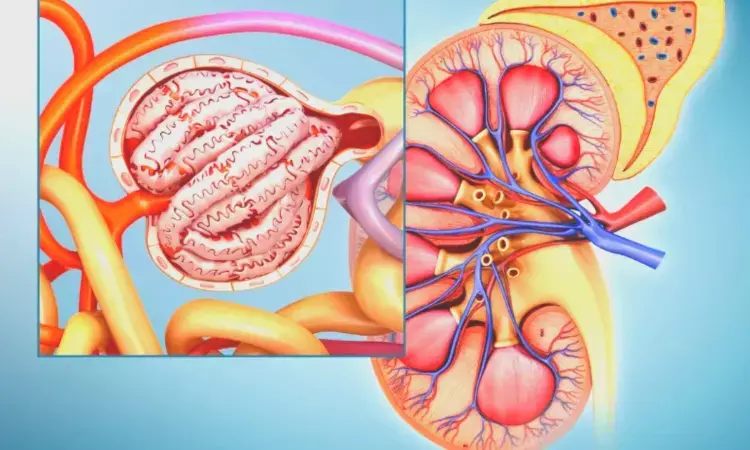- Home
- Medical news & Guidelines
- Anesthesiology
- Cardiology and CTVS
- Critical Care
- Dentistry
- Dermatology
- Diabetes and Endocrinology
- ENT
- Gastroenterology
- Medicine
- Nephrology
- Neurology
- Obstretics-Gynaecology
- Oncology
- Ophthalmology
- Orthopaedics
- Pediatrics-Neonatology
- Psychiatry
- Pulmonology
- Radiology
- Surgery
- Urology
- Laboratory Medicine
- Diet
- Nursing
- Paramedical
- Physiotherapy
- Health news
- Fact Check
- Bone Health Fact Check
- Brain Health Fact Check
- Cancer Related Fact Check
- Child Care Fact Check
- Dental and oral health fact check
- Diabetes and metabolic health fact check
- Diet and Nutrition Fact Check
- Eye and ENT Care Fact Check
- Fitness fact check
- Gut health fact check
- Heart health fact check
- Kidney health fact check
- Medical education fact check
- Men's health fact check
- Respiratory fact check
- Skin and hair care fact check
- Vaccine and Immunization fact check
- Women's health fact check
- AYUSH
- State News
- Andaman and Nicobar Islands
- Andhra Pradesh
- Arunachal Pradesh
- Assam
- Bihar
- Chandigarh
- Chattisgarh
- Dadra and Nagar Haveli
- Daman and Diu
- Delhi
- Goa
- Gujarat
- Haryana
- Himachal Pradesh
- Jammu & Kashmir
- Jharkhand
- Karnataka
- Kerala
- Ladakh
- Lakshadweep
- Madhya Pradesh
- Maharashtra
- Manipur
- Meghalaya
- Mizoram
- Nagaland
- Odisha
- Puducherry
- Punjab
- Rajasthan
- Sikkim
- Tamil Nadu
- Telangana
- Tripura
- Uttar Pradesh
- Uttrakhand
- West Bengal
- Medical Education
- Industry
New study identifies five ferroptosis-related genes which may be a novel therapeutic target for focal segmental glomerulosclerosis

China: Ferroptosis-related genes could be a novel therapeutic target for focal segmental glomerulosclerosis, a recent study published in BMC Nephrology has shown.
This study identified the Hub ferroptosis-related genes (FRGs) and transcriptomic molecules from focal segmental glomerulosclerosis (FSGS) in renal tubules, thus providing novel diagnostic and therapeutic targets for FSGS.
Focal segmental glomerulosclerosis is characterized by partial glomerular (focal) or partial glomerular capillary loops (segmental) sclerosis. In most world parts, FSGS is one of the main causes of glomerulopathy in end-stage renal disease (ESRD).
FSGS treatment primarily includes immunosuppressive therapy, corticosteroids, and kidney transplantation. However, FSGS patients have become resistant to immunosuppressive therapy and corticosteroids, thus showing a limited response to FSGS. The existing treatment modalities and efficacy of FSGS are inadequate in delaying ESRD progression, necessitating more effective treatment for FSGS management.
Recent studies have suggested ferroptosis participation in various renal diseases. However, no clarity exists on its effect on focal segmental glomerulosclerosis. Therefore, Lan Chen, Fujian Medical University, Fuzhou, China, and colleagues analyzed the GSE125779 and GSE121211 datasets to identify the differentially expressed genes (DEGs) in renal tubular samples with and without FSGS.
The research team used the Cytoscape to construct the protein–protein interaction network. Moreover, they obtained ferroptosis-related genes from the ferroptosis database, while ferroptosis-related DEGs were obtained by intersection with DEGs. Kyoto Encyclopedia of Genes and Genomes (KEGG) analysis and Gene Ontology (GO) were used for target genes analysis.
The GSE108112 dataset was used to confirm the expression of target FRGs. Besides, the tea built the mRNA-miRNA network regarding FRGs using the NetworkAnalyst database, and circRNAs corresponding to key miRNAs were predicted in the ENCORI database.
The key findings of the study were as follows:
- 16 ferroptosis-related DEGs were identified between FSGS and healthy subjects, while five co-expressed genes were obtained by three topological algorithms in Cytoscape. These included the most concerned Hub genes JUN, HIF1A, ALB, DUSP1 and ATF3.
- The KEGG enrichment analysis indicated that FRGs were associated with mitophagy, renal cell carcinoma, and metabolic pathways.
- The co-expressed hub genes were analyzed to construct the mRNA-miRNA interaction network, and important miRNAs such as hsa-mir-155-5p, hsa-mir-1-3p, and hsa-mir-124-3p were obtained.
- 75 drugs targeting 54 important circRNAs and FRGs were predicted.
The study identified five ferroptosis-related genes, which may be potential novel diagnostic markers for renal tubulointerstitial injury in FSGS.
"Our prediction of several miRNAs will provide valuable reference information for the ferroptosis-related pathological mechanism of FSGS, and the prediction of targeted drugs provides direction for clinical treatment," the researchers wrote.
"There is a need for further clinical and basic studies to elucidate the specific mechanistic details of ferroptosis in FSGS-associated tubulointerstitial damage in the future," they concluded.
Reference:
Lin, Y., He, J., Mou, Z. et al. Ferroptosis-related genes, a novel therapeutic target for focal segmental glomerulosclerosis. BMC Nephrol 25, 58 (2024). https://doi.org/10.1186/s12882-024-03490-5
Dr Kamal Kant Kohli-MBBS, DTCD- a chest specialist with more than 30 years of practice and a flair for writing clinical articles, Dr Kamal Kant Kohli joined Medical Dialogues as a Chief Editor of Medical News. Besides writing articles, as an editor, he proofreads and verifies all the medical content published on Medical Dialogues including those coming from journals, studies,medical conferences,guidelines etc. Email: drkohli@medicaldialogues.in. Contact no. 011-43720751


